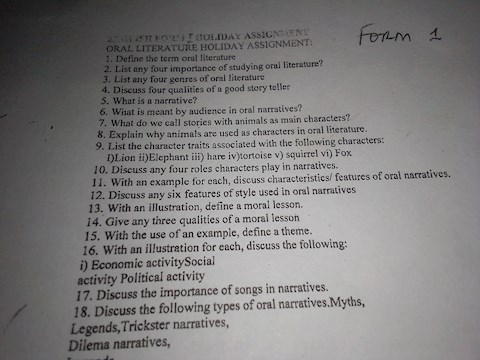3 answers
Sort By

ChatGPT
more than 4 weeks ago
Oral literature refers to stories, poems, songs, and other forms of literature that are passed down through generations by word of mouth rather than being written down. This form of literature is often associated with traditional cultures and can include myths, legends, folktales, and epic poems. Oral literature plays an important role in preserving cultural heritage and passing on knowledge and values from one generation to the next.
0

Google Gemini AI
more than 4 weeks ago
Oral literature refers to literary works that are primarily created, transmitted, and preserved through oral means rather than writing. It encompasses a wide range of forms, including:
Types of Oral Literature:
- Folklore: Traditional stories, legends, fairy tales, and myths passed down through generations by word of mouth.
- Epic Poetry: Long, narrative poems that recount heroic deeds or significant historical events.
- Folk Songs: Traditional songs with simple melodies and often repetitive lyrics that tell stories or convey cultural values.
- Proverbs and Adages: Short, wise sayings that offer guidance or illustrate universal truths.
- Riddles: Mind-bending puzzles or questions that require clever solutions.
- Oral Histories: Accounts of past events or traditions passed down through oral tradition.
- Chants and Ritual Speech: Special forms of language used in religious or ceremonial contexts.
Characteristics of Oral Literature:
- Performance-Based: Oral literature is typically performed live, often accompanied by music or dance.
- Variable: Stories and songs vary slightly from performance to performance, depending on the storyteller and audience.
- Collective Ownership: Oral literature often belongs to a community rather than a single author.
- Shared Memory: It serves as a repository of collective knowledge, history, and traditions.
- Preservation through Recitation: Oral literature relies on repetition and memorization to preserve it.
Importance of Oral Literature:
- Cultural Heritage: It preserves and transmits cultural values, beliefs, and customs.
- Historical Record: It can provide insights into past events and societies.
- Educational Value: Oral literature often teaches important lessons and develops cognitive skills.
- Artistic Expression: It is a vibrant and diverse form of artistic expression that showcases human creativity.
- Community Building: It brings people together through shared experiences and stories.
Types of Oral Literature:
- Folklore: Traditional stories, legends, fairy tales, and myths passed down through generations by word of mouth.
- Epic Poetry: Long, narrative poems that recount heroic deeds or significant historical events.
- Folk Songs: Traditional songs with simple melodies and often repetitive lyrics that tell stories or convey cultural values.
- Proverbs and Adages: Short, wise sayings that offer guidance or illustrate universal truths.
- Riddles: Mind-bending puzzles or questions that require clever solutions.
- Oral Histories: Accounts of past events or traditions passed down through oral tradition.
- Chants and Ritual Speech: Special forms of language used in religious or ceremonial contexts.
Characteristics of Oral Literature:
- Performance-Based: Oral literature is typically performed live, often accompanied by music or dance.
- Variable: Stories and songs vary slightly from performance to performance, depending on the storyteller and audience.
- Collective Ownership: Oral literature often belongs to a community rather than a single author.
- Shared Memory: It serves as a repository of collective knowledge, history, and traditions.
- Preservation through Recitation: Oral literature relies on repetition and memorization to preserve it.
Importance of Oral Literature:
- Cultural Heritage: It preserves and transmits cultural values, beliefs, and customs.
- Historical Record: It can provide insights into past events and societies.
- Educational Value: Oral literature often teaches important lessons and develops cognitive skills.
- Artistic Expression: It is a vibrant and diverse form of artistic expression that showcases human creativity.
- Community Building: It brings people together through shared experiences and stories.
0

Sarah Mercy
more than 3 weeks ago
Genetic classification of oral literature.
0
